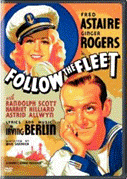Follow the Fleet ____ 8/10
A classic that pays off with a monster
Fred and Ginger song-and-dance at the end
Written by Allan Scott (screenplay)
Hubert Osborne (play)
Directed by Mark Sandrich

Fred Astaire ... Bake Baker
Ginger Rogers ... Sherry Martin
Randolph Scott ... Bilge Smith
Harriet Hilliard ... Connie Martin
Astrid Allwyn ... Mrs. Iris Manning
Betty Grable ... Trio Singer
Lucille Ball ... Kitty Collins
Readers of my movie reviews realize occasionally I like to dig back into the vault of golden memories, even before I was born, to check out the classics. Follow the Fleet is one such classic that you may have a hard time finding at your local video store, but NetFlix carries the DVD complete with some fascinating special features.
Fleet was released in 1936 during the middle of the depression when people were having a tough time worldwide finding jobs or even finding food to put on the table. In Europe Hitler was on the rise, along with other nationalist/ socialist whackjobs. In the United States seeds of the Cartel sown with the Federal Reserve Act and the income tax amendment (16) were beginning to bear fruit for connected finance capitalists and their dominating secret societies.
For the average guy and girl, times were tough. Enter Hollywood with at least some hopeful images—I don't think we can properly call them propaganda at this point, even though this particular movie revolves around war-preparatory naval exercises. The real issue for boys and girls then, as now, was how to hook up with the right one, lead a decent life, have wonderful children, with a modicum of grace and elegance.
The odds were long.
I'm not really sure why I picked this movie; maybe I figured Mom would like to come over and watch it, too. She was 10 years old when it came out, living in the little rural Danish community of Greenville, Michigan. Indeed, later she worked as an usher and cashier in the town theater(s) and got to see almost every movie Hollywood sent to the Hinterland.
Astaire and Rogers were fabulously successful stars in the 1930s, for RKO. Why? I'm guessing because they projected confidence, normality, a fresh and easy goodness... with supreme musical and choreographical skill. They were just like everyone else, only moreso; they dressed well and they were happy. Fleet is also one of Irving Berlin's finest hours.
The plot is
straightforward corn pone. Two sailors on exercises in the Pacific, Bake Baker (Fred Astaire) and Bilge Smith (Randolph Scott), come on shore—I believe it's San Francisco—to get lucky. Only in those days, you didn't get lucky, at least with a nice girl, until you were properly hitched in the eyes of the Lord. So their shoreleave is spent drinking beer, dancing, and schmoozing—in what looks to me to be rather posh nighttime entertainment outlets.
Bake is trying to reconnect with his sweetheart Sherry Martin (Ginger Rogers), who sings and dances. He wants to marry her, even though before he joined the Navy she'd demurred. Sherry has a sister, Connie (Harriet Hilliard[1]), who teaches school and is normally quite schoolmarmish. Connie inadvertently runs into Bilge the Beefcake; he becomes interested in her after she dons a knockout evening gown from her sister's dressing room and reenters the nightclub.
The dialog of the two couples is vintage American Puritan Ethic. Bake is ready for a committed monogamous relationship and is back to see if Sherry is ready (she is). Bilge on the other hand still clings to his Madonna-whore syndrome
and wants to "sleaze" around—i.e. actually get lucky—with women he's hot for as opposed to settling down with a woman who will be his wife and mother figure.
Everyone has some issues to sort out. Needless to say, the sisters have excellent values, are excellent values, and are both attractive and hot enough in their own ways to be much better than these two yoyos deserve. I like the little subplot in which Connie's deceased father bequeaths a sailing yacht to her; she loves to sail, as does Bilge, but she cannot realistically own the boat without him at her helm, so to say.
One thing I pick up on is how back in the day, everyone "dresses" when they go out. Not being an expert, I think the women's suits and gowns, even casual clothing, is probably top of the line from designers of the day. In reality, I wonder if women of their social station would be able to afford those beautiful threads. They're fabulous.
Anyway, it seems to all come together and work out: happy ending with the girls getting their men and the guys having a home when they return from preparing to fight the Yellow Horde or the Nazis, depending on which meatgrinder the Cartel's war machinery wants to send them into.
But this is no time for handwringing analysis. The movie closes with a perfect song and dance by Astaire and Rogers, which in my humble opinion, makes the movie. I'll be renting it again several times just to see this spellbinding number.
There may be trouble ahead
But while there's music and moonlight
(moonlight and music) and love and romance
Let's face the music and dance
Encouraging words in a 1936 musical and encouraging words for our own time.
[1] Harriet Hilliard becomes none other than Harriet Nelson, the mother of Ricky Nelson. Now, I suppose some of you youngsters are going to scratch your heads and say, "Who the heck is Ricky Nelson?"
2007 August 10
Copyright © Brian Wright | The Coffee Coaster™
Follow the Fleet | Let's face the music and dance | Irving Berlin
|




